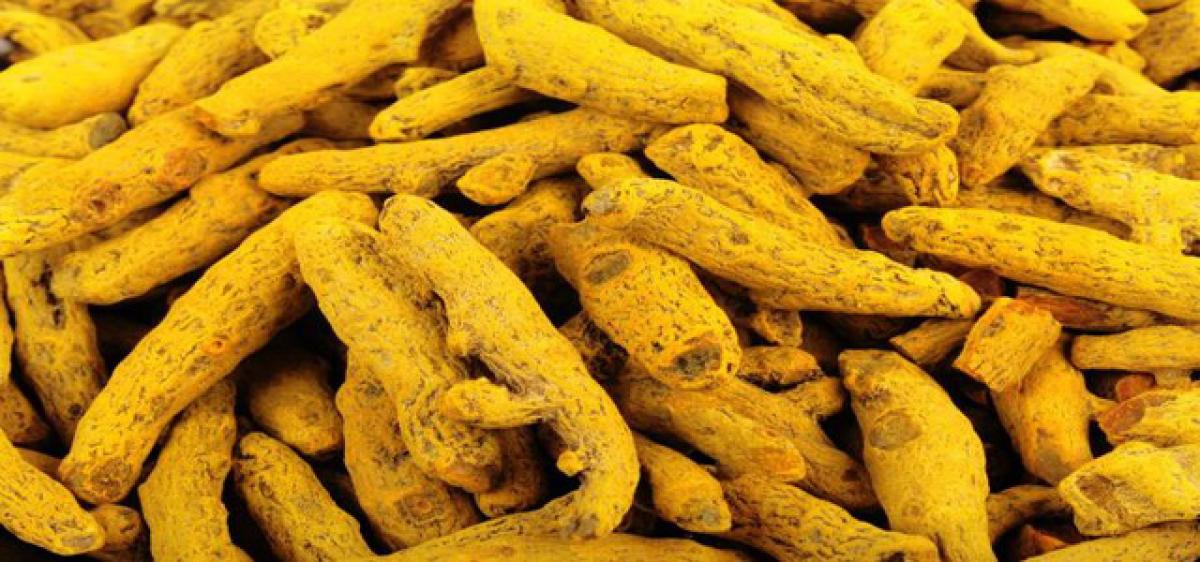Turmeric imports hurt farmers

The ever-growing turmeric imports have become a death knell to the farmers of the two Telugu states. The imports have gone up by 500 per cent during the last five years resulting in severe loss to the farmers.
Hyderabad: The ever-growing turmeric imports have become a death knell to the farmers of the two Telugu states. The imports have gone up by 500 per cent during the last five years resulting in severe loss to the farmers.
Several experts warn that the wide gap between the indigenous cultivation and import of turmeric might deteriorate the condition further and might lead to suicide of turmeric farmers.
India produces 75 per cent of total turmeric production in the world. However, the turmeric farmer is yet to get remunerative price for his produce. Traditionally, turmeric is cultivated in India from ages and the two Telugu states have a special place in its cultivation.
The demand for turmeric is growing by leaps and bounds right from food preparation to cosmetics and medicines. However, the traders have been importing turmeric from foreign countries like Pakistan, China, Haiti, Thailand, Jamaica and others giving a death blow to the indigenous cultivators.
Since there is no import duty on turmeric, the produce is available at low price from other countries. Following fall in demand in the Indian market, the farmers too reduced the area of turmeric cultivation. For instance, the Indian farmers produced 14 lakh tonnes of turmeric during 2011-12.
However, the production came down to 8.43 lakh tonnes this year. In essence, the production has come down by 5.5 lakh tonnes. At the same time, the imports have gone up from 2,325 tonnes in 2011-12 to 4,645 tonnes this year, which means the value of imports have gone up from Rs 30 crore to Rs 146 crore.
However, there is negligible change in the export from India. The farmers exported turmeric worth Rs 734 crore in 2011-12 while it is only Rs 744 crore in 2014-15. Indian farmers are suffering heavy loss due to the import of turmeric and poor export of their produce.
It is all the more harmful to the interest of the farmers of two Telugu states as more than half of the turmeric produced in the country comes from the two Telugu states. For instance, out of the 10.92 lakh tonnes of turmeric produced in the country, 2.52 lakh tonnes from Telangana and 1.51 lakh tonnes from Andhra Pradesh was produced.
The market price of turmeric has not been stable for the last five years. Nobody knows when the price would go up or when it comes down. When there were no imports, the farmers used to get Rs 16,000 per quintal of turmeric and post-imports, the price has come down to Rs 7,000.
Turmeric exporters Jampala Krishna Rao and Venkat Rao told The Hans India that the imports caused fall in the price of turmeric in India.
Turmeric cultivation is cost intensive. Narayana and Lakshmamma of Armour in Nizamabad district told The Hans India that it costs at least Rs 1 lakh per acre to cultivate turmeric.
A number of farmers this year switched to other crops like soya and maize in the absence of reasonable price for turmeric.
Kisan Congress vice-president Anvesh Reddy, who has been fighting on behalf of the turmeric farmers, said that the turmeric production would suffer if the farmers switched over to other crops. The government should stop turmeric imports immediately to save our farmers, he demanded.
Sarampalli Malla Reddy, vice-president of All India Farmers Association, warned that the Telangana farmers would be compelled to commit suicide if the imports were not stopped forthwith.
If the imports were inevitable, there should be at least 100 per cent import duty to make our farmers to compete with the foreign turmeric, he suggested. He found fault with the Central government for not fixing the minimum support price for turmeric which is an essential commodity.
The Indian turmeric is inferior in quality, some experts feel. There would be demand for turmeric if the curcumin in it exceeds 5 per cent. Indian farmers do not take up cultivation of that variety with high curcumin since it is prone to pests.
Duggirala market committee chairman Vanga Sambi Reddy admits that there is only 2.5 per cent curcumin in the turmeric cultivated here.
Aldas Janaiah, agriculture scientist, suggests that the turmeric variety which could withstand pests with high curcumin percentage should be developed. He said that there should be more research into new varieties and at the same time turmeric cultivation should be modernsied.
Then the demand for our turmeric would go up in the international market and exports would improve earning more foreign currency, he added.
Chengal Reddy and Jaipal Reddy, leaders of all India farmers association, said that if the import of turmeric continued for the simple reason that it was cheap, the country which is famous for turmeric production would lose its place to other countries.
Unfortunately, there is no turmeric board to safeguard the interest of farmers. There has been demand for the formation of a separate turmeric board but the central government is not responding to it. Presently, the turmeric is under the control of Spices Board.
Nizamabad MP K Kavitha said that if there is a separate board for turmeric, the problems of the farmers could be solved. She said that she would write to the chief ministers of nine states which produce turmeric to garner their support for the establishment of turmeric board.
Vissa Kiran, representative of Ryot Swaraj, said that the turmeric farmers would never get remunerative price unless there is a farmer-friendly export and import policy. Efforts to contact the Nizamabad agriculture department officials proved futile to know their point of view over the import of turmeric.
| Year | Exports (in crs) | Imports (in crs) | Production (lakh tonnes) |
| 2011-12 | 734 | 30 | 14 |
| 12-13 | 554 | 21 | 9.86 |
| 13-14 | 666 | 59 | 10.92 |
| 14-15 | 744 | 79 | 8.46 |
| 15-16 | 921 (Estimated) | 146 | 8.43 |








